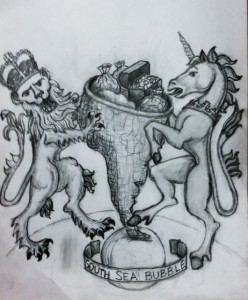Fools and Their Money
Posted in General, On This Day on January 6th, 2015 by Eugene Finerman – Be the first to commentJanuary 6, 1721: The First Government Report on a Stock Market Scandal
 Greed knows no borders, and 1720 was a vintage year for it. French investors had succumbed to the prospect of gold mines in Louisiana; for a short while, they had even become rich–on paper. English investors were envious and eagerly sought a stock that would make them all rich, too. So they placed their hopes and Pounds in the South Sea Company, a British business that could claim a lucrative privilege. The Crown had granted the Company a monopoly on trade with South America. The gold and gems, the spices, even the parrots–all the treasures of a continent–were ceded to the South Sea Company. Its investors were certain of a fortune.
Greed knows no borders, and 1720 was a vintage year for it. French investors had succumbed to the prospect of gold mines in Louisiana; for a short while, they had even become rich–on paper. English investors were envious and eagerly sought a stock that would make them all rich, too. So they placed their hopes and Pounds in the South Sea Company, a British business that could claim a lucrative privilege. The Crown had granted the Company a monopoly on trade with South America. The gold and gems, the spices, even the parrots–all the treasures of a continent–were ceded to the South Sea Company. Its investors were certain of a fortune.
There was only one drawback to this wonderful monopoly; the wrong Crown had granted it. Spain controlled most of South America. The British did not even have Guyana at the time. So the South Sea Company had to convince Spain to honor the British monopoly, and its timing was not opportune. Britain and Spain had just recently ended an 11 year-long war; England’s express aim had been to oust the Bourbon King from his throne. The South Sea Company evidently hoped that Felipe V had either a good nature or a bad memory. He had neither. In fact, Spain restricted the Company’s trade in South America to one ship a year.
Even worse for the Company, the trade proved disappointing. The British had hoped that the South Americans would want African slaves, but there really was not much of a market for them. The Spanish already had the entire population of Latin America for serfs.
Those were the dismal facts and mediocre returns on the Company’s ledgers, but the Stock Market could ignore such minor details. In January the company’s stock was trading at 128 Pounds, but investors began bidding it up. In March the stock’s price rose to 330 Pounds. There was no real reason for that increase, but the gain only incited further demand for the stock. The other investors couldn’t be wrong, and no one wanted to be the last to buy the stock. The buying frenzy continued. By August, the stock price was 1000 Pounds.
Of course, very few people actually had that kind of money; they were buying on credit–which is effortless until you have to pay it back. Some creditor must have tactlessly asked for repayment, and suddenly no one wanted to pay 1000 Pounds for a 100 Pound stock. That set off a cascade of selling. By December the stock price was 124 Pounds. Reality had its belated say in the market.
Parliament, especially the members who had lost money, insisted on an investigation. The government report was presented this day: January 6, 1721. As it turned out, the Company had bribed a number of government officials; apparently Crown monopolies are not granted solely on merit. The directors of the Company had their estates confiscated; one government official went to prison. Of course, the Prime Minister promised further reforms. And with that stern retribution, nothing like this has ever happened again.
Reflecting on the market scandal, Isaac Newton said, “I can calculate the motion of the heavenly bodies, but not the madness of people.” Having lost 20,000 Pounds, he was speaking from experience.
The absurdity inspired Jonathan Swift to write:
The Nation too, too late will find
Computing all their Cost and Trouble
Directors Promises but Wind
South Sea at best a mighty Bubble.
And, thanks to Swift, we now describe such financial lunacy as a bubble.